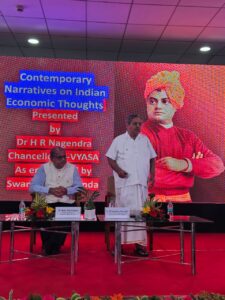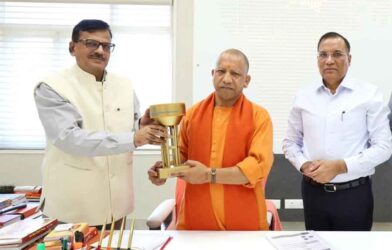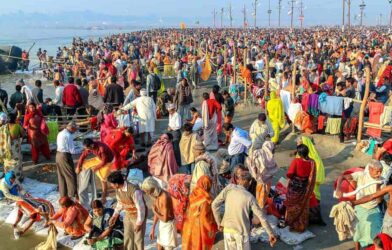Varanasi: Reserve Bank of India, Lucknow organised a symposium on “Contemporary Narratives on Indian Economic Thoughts” on September 14, 2023 at Banaras Hindu University, Varanasi. As a co-host of all the G20 Finance Track Meetings, the Reserve Bank of India is participating in the 4th Sustainable Finance Working Group meeting scheduled at Varanasi on September 13-14, 2023. The symposium was befittingly organised in the backdrop of India’s G20 Presidency, celebrating the nation’s rich cultural heritage while fostering intellectual discourse on economic insights that transcend borders. It underscored the ancient Indian story of economic and fiscal policy, governance, public policy, and Indian Jurisprudence.
At the outset, Dr. Balu Kenchappa, Regional Director, RBI, Lucknow warmly welcomed all the participants. While impressing upon the great economic sutra of G20 ‘वसुधैव कुटुम्बकम्’, he espoused on the importance of collective efforts enshrined in ‘One Earth, One Family and One Future’ and its role in fostering global economic growth. A notable highlight of the symposium was the keynote address delivered by Dr. H R Nagendra, Chancellor, Swami Vivekananda Yoga Anusandhana Samsthana (S-VYASA) University, Bengaluru which was followed by an eclectically insightful panel discussion.
In his address, Dr. H R Nagendra exhorted as to how the ancient Indian economic ideas have been providing a deeper insight into India’s culture, tradition, and inherent national characteristics. He emphasized how the synergy of politics, ethics, and economics with the Vedas, Arthasastra, the Ramayana and Mahabharata, Manusmriti, Sukraniti, and several other ancient Indian texts, have skilfully and holistically contributed to the nation’s growth and wellbeing.
Subsequently, Dr. Ashutosh Yashwant Raravikar, Director, Department of Economic Policy and Research, RBI, Mumbai traversed through the history of RBI and its path to prosperity. Dr. Manjusha Pandharinath Kulkarni, Administrative officer, Deputy Chief Minister’s Secretariat, Maharashtra gave anecdotal insights concerning the originality of Kautilya’s Arthashastra and expressed her views on the contemporary relevance of its principles.
The panel discussion on the theme of “Dilemmas in Balancing Gross Domestic Product and Gross National Happiness- Learnings from Ancient Texts” featuring distinguished academicians including Prof. MK Agrawal, Head, Department of Economics, University of Lucknow; Prof. Sudhakar Mishra, Department of Vedanta, Sampurnanand Sanskrit Vishwavidyalaya, Varanasi; and Prof. Mrutyunjaya Mishra, Head, Department of Economics, Banaras Hindu University, kept the audience enthralled. The panel discussion was moderated by Dr. Balu Kenchappa, Regional Director, Lucknow.

The panellists gave a valuable insight into the important learnings from several ancient texts, specially Kautilya’s Arthashastra, which vividly describes and chronicles the historical relevance of the administrative procedures, the duties of kings, ministers, and government officers, covering almost every aspect of economics pertinent to a welfare state even today, is invaluable, thereby aiding in balancing economic growth and overall wellbeing.
The symposium while serving as a noteworthy platform, celebrating India’s economic thoughts, philosophy, wisdom, and history, has highlighted the fascinating insights of ancient Indian economics and the policy making, successfully bringing to the forefront their relevance even today. Around 250 students and teachers participated in the program. Going forward, the discussions and deliberations of the symposium are bound to create self-sustaining platforms for discourse and discussions on the subject matter and build wider interest and competencies amongst the participants.
-PIB












